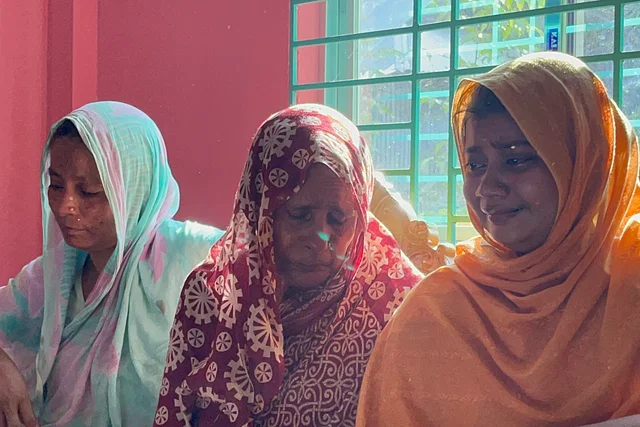
Nazma Begum (45) has worked at a private hospital in the Bonshree area of Dhaka for over a decade. Her son, Nazmul Hasan (21), worked part-time at the same hospital while pursuing his studies. Their household expenses were covered by their combined income. On July 19, Nazmul was shot and killed on his way to the hospital from their home in Aftabnagar. His mother is now speechless from grief. Whenever someone visits their house, she cries uncontrollably.
Nazmul, originally from the Chapatali area of Muradnagar, Comilla, had been living with his mother at his maternal grandfather’s house in Char Gobindapur Northkandi village of Madaripur Sadar. His permanent address was in Madaripur, but due to work, the mother and son were residing in a rented house in Aftabnagar, Dhaka.
Char Gobindapur Northkandi village is about 15 kilometers from Madaripur city. On Saturday afternoon, when visiting Nazmul’s maternal grandfather’s house, one could see Nazma Begum sitting against a wall on the veranda of a large tin-shed room. The house was eerily silent. Nazmul’s cousin, Suman Kazi, was standing in the yard. Upon learning the reporter’s identity, he said, “My brother has been lying in the grave for eight days. He was buried in a cemetery right next to the house.”
Nazmul’s elder sister, Tanzila Akter (26), helped her mother from the veranda to a sofa on the floor. Eventually, she broke down in tears. Tanzila and her husband tried to console her. She mourned the brutal incident involving her son and said, “How can I endure this pain? My only son is gone. I have no one left but him. I raised him with great difficulty, educated him, and now this is what I’ve received. What was my Manik’s fault, that he had to die from a gunshot? How will I live, oh Allah?”
Nazma Begum told Prothom Alo, “Mother and son worked together. My husband used to say, ‘Mother, you won’t have to suffer anymore. I will save money and go abroad, and my sister will work, so you won’t have to endure any more hardship.’ Remembering these words, I cannot express the pain in my heart. I ask the government for one thing: may no other mother have to experience this loss.” Nazmul’s relatives said that on July 19, after having lunch, Nazmul was heading from Aftabnagar to Bonshree Farazi Hospital, where he worked as a part-time physiotherapist. That day, there was widespread violence due to the quota reform movement. Nazmul was walking to Bonshree via the Gudara Ghat area to avoid the clashes. He was shot while ascending the Gudara Ghat bridge. Several protesters rescued him and took him to a private clinic in Gudara Ghat. He died in the evening while receiving treatment. His body was brought to Madaripur by ambulance that night, and he was buried in his grandfather Abdul Rahman Matubbar’s family graveyard after the funeral.
Nazmul’s elder sister, Tanzila Akter, said, “My brother used to help me with my studies while working. I still can’t believe that my brother had to die this way. I cannot explain the turmoil inside my chest. Who will give justice for why my brother was shot, if not Allah?”
Nazmul’s cousin, Suman Kazi, mentioned that Nazmul had completed higher secondary education at Imperial College in Dhaka last year and was pursuing a degree. He earned 12,000 Taka working part-time at the hospital, which he used to support his mother.
Madaripur District Commissioner Mohammad Marufur Rashid Khan said, “Many people have died due to the violence. However, we do not have specific information about the location at the moment. If the victim’s family applies for assistance, we will provide help as much as we can.”